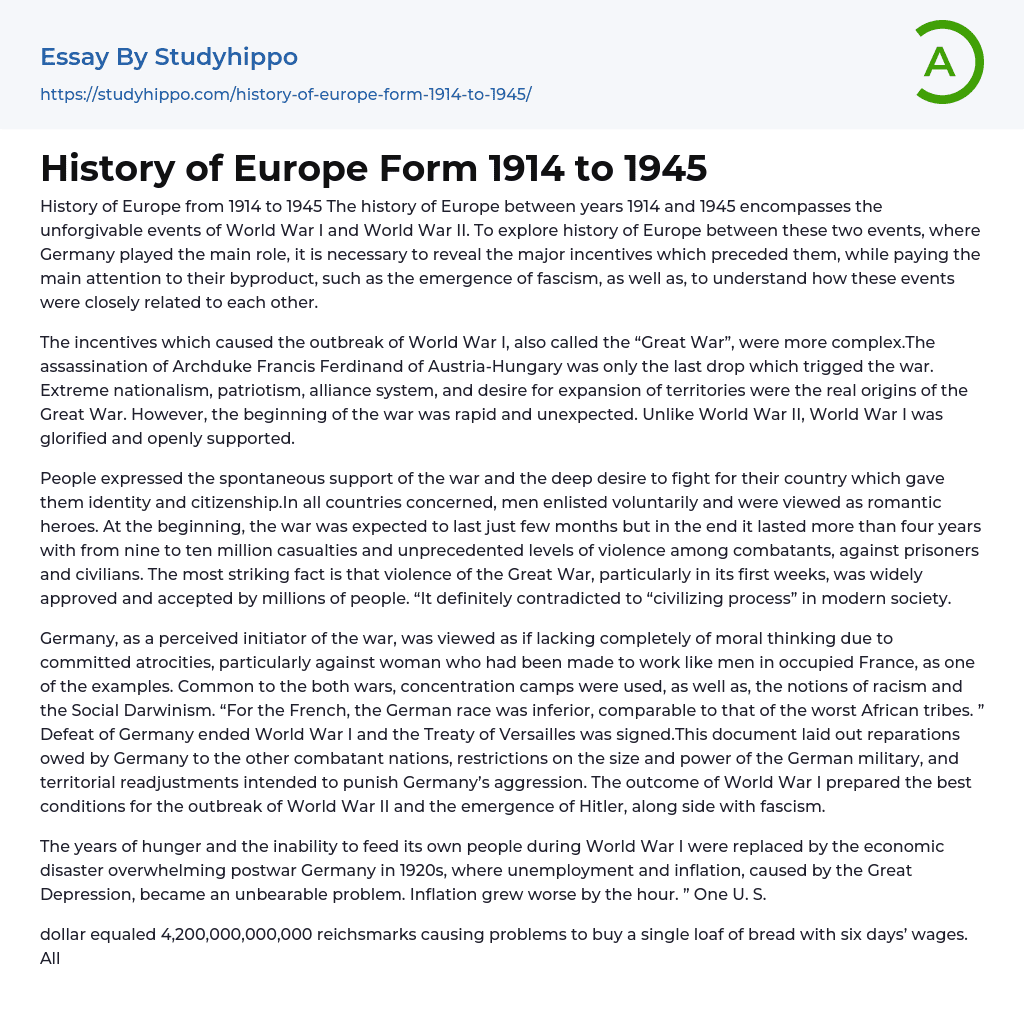The era between 1914 and 1945 in Europe, which encompassed World Wars I and II, requires an analysis of the underlying factors that contributed to these conflicts. As Germany played a significant role during this period in European history, examining the causes leading up to both wars is essential. Furthermore, it is critical to consider how fascism emerged as a result of these wars and their interconnectivity.
The causes of World War I, also known as the "Great War", were not solely due to the assassination of Archduke Francis Ferdinand of Austria-Hungary. The true reasons for this conflict included extreme nationalism, patriotism, territorial expansion ambitions and the alliance system. Despite its multifaceted origins, World War I commenced abruptly and was openly celebrated and endorsed unlike World War II.
Throughout the Great War, people from all affected nations had
...an innate desire to defend their homeland and establish a sense of identity and nationality. Joining the military was considered a heroic act, despite initial hopes that the conflict would end within months. Sadly, it lasted over four years and caused between nine to ten million casualties. The unprecedented violence against soldiers and civilians during this time was accepted by millions of people, which contradicted the belief that modern society was becoming more civilized.
Germany's lack of moral thinking during World War I was attributed to its atrocities, particularly against women who were forced to work like men in occupied France. The country's perpetration of concentration camps, racism, and Social Darwinism also contributed to the perception that Germany initiated the war. Even the French saw the German race as inferior to African tribes. As a result of their defeat i
the war, Germany was required to pay reparations, face restrictions on their military and undergo territorial adjustments under the Treaty of Versailles. Unfortunately, these outcomes paved way for World War II and Hitler's fascism.
Germany's situation underwent a significant change after World War I. Rather than enduring prolonged famine and an inability to support its citizens, the country experienced a severe economic crisis during the 1920s, which was exacerbated by the Great Depression. As a result, unemployment reached unbearable levels, and prices continued to rise steadily. This is evident in a statement made by the United States: "One U.S."
The cost of a loaf of bread with six days’ wages was affected by the dollar’s exchange rate, which was equivalent to 4,200,000,000,000 reichsmarks. Due to these events, people concluded that democracy, as represented by the Weimar republic, had not provided any benefits. Instead, they desired a powerful leader to revive Germany and restore their sense of national identity. The individual who could pledge to deliver economic stability would win the hearts and spirits of the nation.
Hitler presented Germany as a superior nation, resonating with those fearful of communism and democracy. The appeal of ending their suffering paved the way for Hitler's rise and the emergence of fascism in Europe. Disenchanted World War I veterans struggling to adapt to civilian life were ideal recruits for fascism due to unemployment and poverty. Leaders like Mussolini used propaganda and nationalist rallies to manipulate people into committing brutal acts in blind devotion.
German fascism was founded on anti-Semitism and the desire for territorial expansion in order to establish a superior race. The pursuit of Lebensraum, or living space, was a key motivator
behind Germany's aggressive territorial ambitions which triggered World War II. Initially, France and Britain sought appeasement to prevent another war. However, Hitler's first actions towards achieving his Lebensraum plan included violating the Treaty of Versailles, re-occupying Rhineland, and acquiring Czechoslovakia's Sudetenland.
Hitler aimed to reduce the population of conquered territories and substitute the current inhabitants with a superior Germanic race. His primary objective was to eradicate Jewish and Slavic individuals by transporting them to concentration camps and exploiting other occupied nations for labor. Consequently, numerous Jews and Slavs were either worked to death or exterminated in gas chambers during the Holocaust. Hitler's conquests comprised Poland, Belgium, Holland, Luxemburg, France, Britain, and Russia; nevertheless, he suffered defeat in Stalingrad.
On June 6, 1944, Allied forces began Operation Overlord to invade Nazi-occupied France. This event was a turning point in history and led to the collapse of the Third Reich. Six months later, Russian, British, and American forces launched an offensive that ended World War II. These events were caused by World War I and Hitler and resulted in millions of deaths while also affecting many nations for years to come. We must remember these brutal events as a reminder of how important it is to maintain peace, democracy, and human dignity at all times.
- Elie Wiesel essays
- Nazi Party essays
- Weimar Republic essays
- Holocaust essays
- Adolf Hitler essays
- Concentration Camps essays
- Anne Frank essays
- League Of Nations essays
- Battle Of The Somme essays
- Treaty Of Versailles essays
- D-day essays
- Fascism essays
- 1920S essays
- 1950S essays
- 1960S essays
- 19Th Century essays
- 20Th Century essays
- Ancient Greece essays
- Bravery essays
- British Empire essays
- Civilization essays
- Colonialism essays
- Declaration of Independence essays
- Evidence essays
- Genocide essays
- Gilded Age essays
- Historical Figures essays
- Historiography essays
- History of the United States essays
- Letter from Birmingham Jail essays
- Louisiana Purchase essays
- Nazi Germany essays
- Rebellion essays
- Revolution essays
- Roman Empire essays
- Russian Empire essays
- The Columbian Exchange essays
- Vikings essays
- War essays
- What is History essays
- World History essays
- World Hunger essays
- American Civil War essays
- Atomic Bomb essays
- Attack essays
- Cold War essays
- Crimean War essays
- Diplomacy essays
- Emilio Aguinaldo essays
- Emperor essays




